THE Red Corner boxer who has been knocked out in the first 30 seconds of the first round by the Boxer in the Blue Corner is not in much of a position to claim “we wuz robbed”. 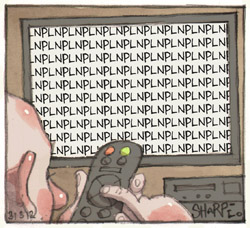 But Labor in Queensland was robbed. It won 27 per cent of the vote and only nine per cent of the seats. Continue reading “Democratic dysfunction in thumping Qld result”
But Labor in Queensland was robbed. It won 27 per cent of the vote and only nine per cent of the seats. Continue reading “Democratic dysfunction in thumping Qld result”
Category: Uncategorized
Miners clutch at constitutional straws
WESTERN Australian Premier Colin Barnett feels hard done by. 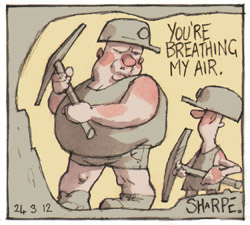 So hard done by that he is willing to chuck his lot in with the miners in a High Court challenge to the mineral resources rent tax. Continue reading “Miners clutch at constitutional straws”
So hard done by that he is willing to chuck his lot in with the miners in a High Court challenge to the mineral resources rent tax. Continue reading “Miners clutch at constitutional straws”
Get rid of middle-class welfare
THE politics of scaremongering comes in short, exaggerated language – talk of disasters and catastrophes, usually when some small government benefit is being removed or the sacred surplus is threatened.  The really scary stuff, though, comes in measured, dispassionate words in a longer discourse of fact and argument. Continue reading “Get rid of middle-class welfare”
The really scary stuff, though, comes in measured, dispassionate words in a longer discourse of fact and argument. Continue reading “Get rid of middle-class welfare”
Consumers of news singularly unprotected
EVERY survey on public respect for vocations has journalists down there with used-car salesmen, real-estate agents, politicians and prostitutes. 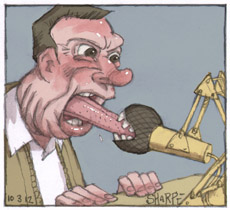 But journalists are different. Continue reading “Consumers of news singularly unprotected”
But journalists are different. Continue reading “Consumers of news singularly unprotected”
No doubt now the dingo took Azaria
LINDY Chamberlain will be 64 tomorrow (Sunday 3 March 2012). 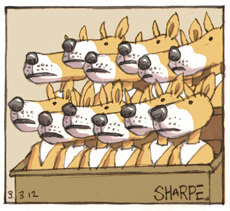 She has spent half her life fighting the accusation that she murdered her baby daughter Azaria at Ayers Rock in 1980. She is continuing the fight now. Continue reading “No doubt now the dingo took Azaria”
She has spent half her life fighting the accusation that she murdered her baby daughter Azaria at Ayers Rock in 1980. She is continuing the fight now. Continue reading “No doubt now the dingo took Azaria”
Union money source of ALP strife
WHOEVER wins on Monday, Kevin Rudd is right about the stranglehold of factional power. It happens because of funding, which is the root cause of Labor’s woes. 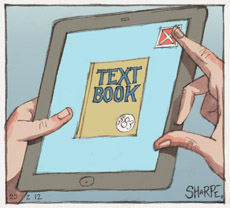 Labor relies for a great proportion of its funds on union dues. It means union-selected delegates get over-represented at the national conference and get too much say in policy development and who gets pre-selected.
Labor relies for a great proportion of its funds on union dues. It means union-selected delegates get over-represented at the national conference and get too much say in policy development and who gets pre-selected.
Union membership in Australia has declined dramatically in Australia over the past three decades. So has Labor Party membership and Labor’s primary vote.
But still the Labor caucus is now made up mainly former political staffers, union officials and lawyers.
Labor Party members get virtually no say in who should be their local member or have any policy input, so why bother. Declining membership, ironically, has caused even greater reliance on union funding.
It may take a bloodbath at the next election for Labor to realise it must ditch its reliance on union funding and union recruitment of MPs. It must broaden the power of members over policy and pre-selection and recruit members on that foundation.
Oddly, when Labor is at an electoral low it seems to attract members – as in 1975.
It may be that after an electoral bloodbath a Coalition Government will do what the NSW Coalition has done and legislate to cap or abolish union funds going to Labor or to advertising Labor causes.
Labor may protest against it, but ultimately it could be Labor’s salvation.
Remember, Rudd does not have a union background. That was fine when his government was going well, but at the slightest downturn the union heavies got him.
Julia Gillard has been a servant to the union movement and there is a fair argument that she went too far in winding back Work Choices.
In a way union power has been at the core of the Rudd-Gillard contest.
Labor has to change from a party whose funding is union-based because that results in its heart and soul being union-based. And if union membership is down to 18 per cent of the workforce, it is a pretty small heart and soul.
DOT DOT DOT
I FIRST entered the University Co-Op Bookshop 43 years ago. And not much has changed.
Prescribed textbooks still line the walls and are stacked on the floor. In the first week of semester you can hardly move.
A lot of still money changes hands, even though these days it via plastic card. Those academics lucky enough to have their textbook prescribed can still look forward to modest or even significant royalties.
It should change. And soon.
This week the Government received the Gonski report on schools funding. Money is short for education.
Well someone should look at the textbook industry and the government should use its market power to deliver more texts to more students vastly more cheaply. It can be done.
Some of my students have expressed despair at the $83 cost of the textbook for the introductory journalism course.
Spoiled academics, of course, have the power to prescribe or de-prescribe textbooks and to put books on reading lists or take them off. So publishers are quite willing to give them free books in the hope they make the lists. They get new editions and even multiple copies.
It is big business. About a third of Australian publishers’ $1.8 billion revenue comes from educational books. It can be done a lot more cheaply electronically, but not in the way the publishers would like.
The $83 text my students are complaining about comes in electronic form, but it costs an astonishing $53. This sort of paltry percentage mark down for the electronic version is typical. The publishers love it. For virtually no outlay or risk, the publisher is getting 60 per cent of the book price. And you can bet the author does not get an extra cut.
The paper version requires costs in paper, ink, transport, labour and retail rent and a large risk for unsold copies.
Now, every textbook sold in Australia was at some time, or still is, in an electronic form somewhere. And every new one will be.
For every student who cannot afford a paper textbook, this is a wasted opportunity. The vast wells of knowledge in paper books could be delivered much more efficiently and cheaply to students electronically. The electronic readers could be delivered through HECS loans.
A courageous Prime Minister could promise no student need live without a textbook by 2015. It would require some sort of imaginative public-private partnership with the publishing industry. Or if they did not co-operate, directly with authors, perhaps through the Copyright Agency Limited.
I am not arguing for a text free-for-all, far from it. Authors, editors and designers should get paid, the same or more than they get now.
It seems such a shame that so many students are denied access to so much knowledge which could be made available at so little cost.
The education sector should move rapidly away from paper texts. The lot could be done for a lot less than $1.8 billion a year and every student would have access to texts at a price that reflects costs reality — fraction of the cost of the paper versions, not at the exorbitant prices that publishers get away with because we have been acclimatised to paying so much for books.
Of course, you can lead students to a text but you can’t make them read, but my guess is that universal access would improve education.
Authors should like it. They would get more royalties because the secondhand market would largely dry up. Students sell texts for money and to make room. With encoded untransferable electronic books, which would be dirt cheap anyway, the secondhand market would wither.
There are other advantages to electronic books, especially in education. They can be annotated and the notes shared. They can be bookmarked and text-searched, thereby improving academic use.
It would be easier for students to bring all their books to campus. Many use public transport, making lugging paper versions quite a chore.
The inaccessible texts on computers in Australia are a wasted resource. There must be a fair and productive way to better use it.
CRISPIN HULL
This article first appeared in The Canberra Times on 25 February 2011.
End legal assault against children
IT ALMOST went under the media radar. It was an objection to the last legal permission for one human being to inflict physical violence against another, aside from self-defence. We have made rape in marriage illegal. We have abolished hanging and whipping in the criminal justice system. We have abolished corporal punishment in schools.
Yet today in Australia it is still legal for parents to physically assault their children – provided it fits the woolly criteria of being “reasonable chastisement” or “reasonable correction”. Continue reading “End legal assault against children”
Bleak outlook for informed polling
CHARLES Dickens the journalist would have written Bleak House a bit differently from Dickens the novelist. 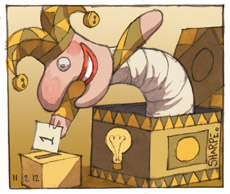 He might have written: “A dispute over a large Yorkshire landowner’s estate collapsed in a London court yesterday when lawyers announced there was not enough money left in the estate to pay their fees. Continue reading “Bleak outlook for informed polling”
He might have written: “A dispute over a large Yorkshire landowner’s estate collapsed in a London court yesterday when lawyers announced there was not enough money left in the estate to pay their fees. Continue reading “Bleak outlook for informed polling”
Paradox of democracy and free speech
LIKE democracy, freedom of speech has a paradox. Democracy’s paradox is obvious: what if they vote for dictatorship? 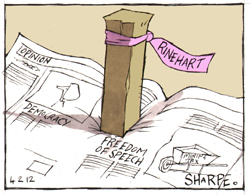 The paradox of freedom of speech is similar, but less obvious. What if someone, in the exercise of their freedom of speech, buys such a large portion of the means of publication that they drown out the freedom of speech of others? Continue reading “Paradox of democracy and free speech”
The paradox of freedom of speech is similar, but less obvious. What if someone, in the exercise of their freedom of speech, buys such a large portion of the means of publication that they drown out the freedom of speech of others? Continue reading “Paradox of democracy and free speech”
Numbers tell grim pokies story
THE numbers tell the story. 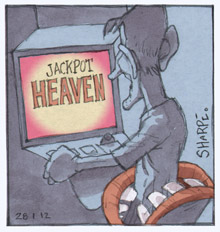 I know numbers are a big turn off, but bear with me because the story is important, and precisely because numbers are a turn-off, the clubs have been able to dismiss problem gambling as a minor matter not affecting many people. Continue reading “Numbers tell grim pokies story”
I know numbers are a big turn off, but bear with me because the story is important, and precisely because numbers are a turn-off, the clubs have been able to dismiss problem gambling as a minor matter not affecting many people. Continue reading “Numbers tell grim pokies story”